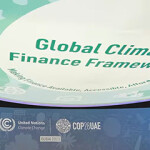Will Thailand get an EU red card?
For many reasons, but highest among them illegal, unreported and unregulated fishing and issues related to human and workers’ rights, Thailand’s fishing and seafood processing industry has been the target of scrutiny and threats of sanctions from the European Union for the past five years.
In April 2015, after declaring Thailand had not taken sufficient measures to tackle its problems, the EU issued the Southeast Asian fishing giant a yellow card – essentially the strongest warning it hands out that doesn’t carry any formal penalty attached. The EU gave Thailand six months to “take the necessary corrective measures.” If Thailand didn’t take sufficient action, the E.U. threatened a red card, which would prohibit Thailand, the third-largest seafood exporter in the world, from exporting its seafood to the European Union.
Fast-forward one year, and the yellow card still stands. On 21 April, the E.U. issued a statement saying it was still “evaluating progress” in Thailand, but that “Dialogue is proving difficult and there remain serious concerns about the steps taken by Thailand to fight IUU fishing activities. This means that further action by the Commission cannot be ruled out. A meeting with the Thai authorities in May will be a new opportunity for them to show their good will and commitment.”
Trouble on the horizon
The same day, Thai Prime Minister Payut Chan-o-cha admitted the government had been slow to resolve illegal fishing conditions and announced the firing of Wimol Jantrarotai, the head of that country’s Fisheries Department, according to the Bangkok Post.
Two days later, on 23 April, documents leaked to the Bangkok Post revealed that E.U. officials perceived Thailand’s efforts at reforming its seafood industry as a “propaganda campaign.”
“As a result, [the E.U] has lost confidence in the Thai government’s operational units, law enforcement, and its implementation of the Fishery Management Plan to deal with illegal, unreported and unregulated (IUU) fishing,” the Post reported.
The E.U. suggested the “goodwill” meeting scheduled for May be postponed to “give Thailand more time to comply with previous agreements.” The meeting ended up taking place and no new developments came to light for about a month, until 24 May, when in a surprising announcement, Thai Deputy Prime Minister General Prawit Wongsuwan said that Thailand had been given six more months to clean up its act.
The plot thickened on 8 June, when a letter from EU officials to Wongsuwan was obtained by the Associated Press. In it, the officials warned Wongsuwan that Thailand must take “swift and determined action” or face a red card. They said talks scheduled for July in Bangkok “will be a crucial opportunity for Thailand to present robust measures” to fight illegal fishing and labor abuses,” according to the AP.
Making the effort
All of this back-and-forth can get confusing, especially when trying to predict if a red card will actually be handed out. Although the actual effect of a red card remains in doubt (see articles by The Nation and Francisco Blaha), interviews I conducted in Boston and Brussels with top Thai officials, and more recently with Gregory Morrow, a Principal at the law firm of Squire Patton Boggs and former Executive Vice President, Chief Legal Officer and Corporate Secretary at Contessa Premium Foods, which had a significant presence in Thailand when Morrow worked there, clarified the situation for me.
Morrow said the E.U.’s initial issuance of the yellow card was something “not anticipated” by Thailand and caught the country’s officials somewhat flat-footed, potentially explaining the country’s admittedly slow response. However, he said, the Thai government “has made significant strides in addressing its issues with IUU” including revisions to its fishing laws, increasing vessel and factory inspections and corralling major industry players into taking a more active leadership role in solving problems.
“The Thai government is taking this seriously,” he said. “I think they deserve credit for implementing additional regulations and really pushing on conducting more and more enhanced investigations into human trafficking and other forms of employee abuses.”
Two important cultural and political factors specific to Thailand are coming into play that are negatively affecting relations between Thailand and the E.U. and leading to unnecessary strife and miscommunication or lack of understanding, Morrow said.
“In the U.S. and E.U., we have a very robust public discussion on many issues that, in Thailand, would not be discussed as openly. The whole concept of not making someone else lose face is taken very seriously in that country. Strategic global issues like this are not dealt with by having head-on, face-to-face debate. There’s more of a feeling of ‘let’s cooperate on this,’” Morrow said. “I think that cultural disconnect is one of the reasons or drivers behind the Thai government and the E.U. ministers missing each other like ships in the night. There needs to be more open communication, but also mutual respect. I’m not saying there’s a lack of respect, but there should be greater efforts at cultivating a more cultural understanding between the E.U. and the country of Thailand.”





Share